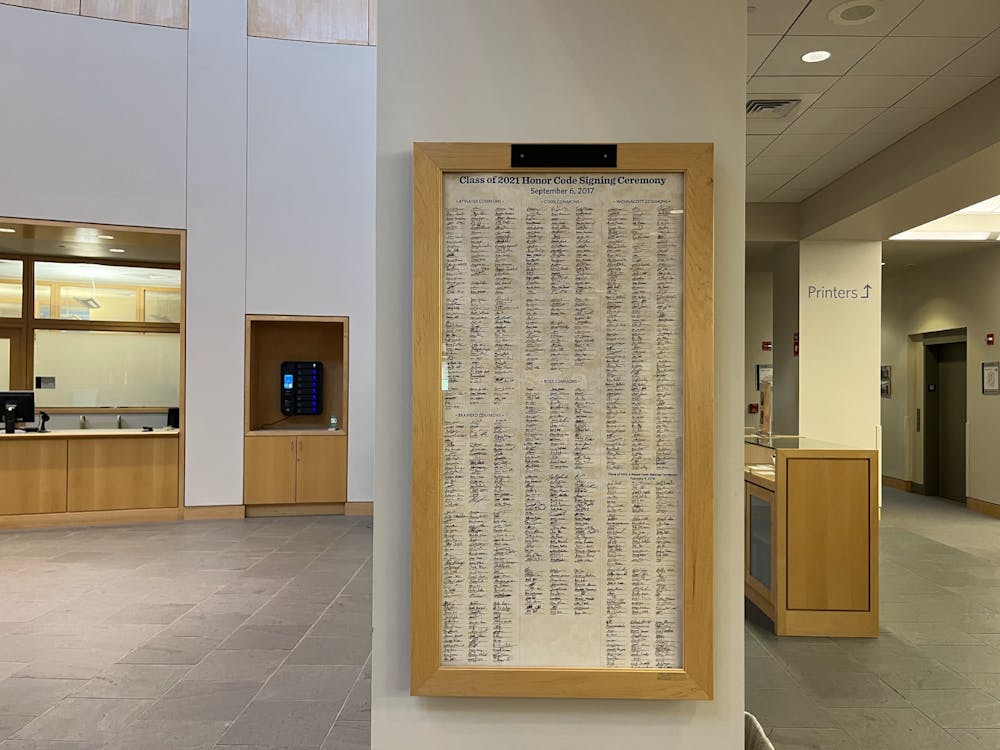The Honor Code Review Committee (HCRC) published an interim report this past May outlining themes in current Honor Code practice as well as recommendations to address the code’s shortcomings. Just one month prior, 65% of Middlebury students self-reported having broken the Honor Code in The Campus’ annual Zeitgeist survey, causing faculty, administrators and students to question what influence the policy still holds.
The draft report identified five overarching trends regarding the current Honor Code system: students regularly violate the Honor Code, holding students accountable to report their peers for violations is unrealistic, faculty should have the ability to proctor their exams, the Honor Code adjudication process is widely misunderstood, and the emergence of generative AI has complicated the line between authorized and unauthorized assistance.
The current report is based on the HCRC’s findings from three open meetings with faculty, an SGA consultation meeting, a survey of students, conversations with various academic and administrative departments, and individual feedback. The online survey sent to students in March 2023 received 53 responses.
The HCRC report notes that the Honor Code’s idealistic, aspirational goals are failing to become reality.
“Overall, there appears to be a consensus among students, staff and faculty that while Middlebury culture does affirm the broad, basic idea that academic integrity is important and cheating is wrong, the reality of daily practice suggests that the Honor Code has ceased to be a meaningful element of learning and living at Middlebury for most students,” the report stated.
In response to the committee’s findings, the report proposes five recommendations for the community: to regularly affirm the meaning of academic integrity, including through reinstating an Honor Code signing ceremony; to remove the moral responsibility for students to report peers’ violations; to clarify the process and consequences in cases of violations; to allow faculty to proctor exams at their discretion; and to clarify language surrounding AI use in the Honor Code and by each instructor.
Some of these proposed reforms have already been supported by students, including calls to mandate exam proctoring and to rebuild a culture of academic trust and respect on campus.
“I think that it would be respected if people saw punishment for breaking the Honor Code that was harsh,” said Zeke Hooper ’25. “If people were caught and were expelled — this would prevent a lot of cheating.”
He also told The Campus that the principles of the Honor Code need to be more meaningfully and routinely ingrained in students, suggesting that each class hold a conversation around academic integrity at the beginning of the semester.
The HCRC’s report was brought to faculty at the Bread Loaf meeting on Sept. 6 for discussion, and the committee continues to solicit community feedback through an online form. In an email to The Campus, the committee wrote that faculty responses and engagement have so far been mostly positive.
Professor of Mathematics and Statistics Emily Proctor is in favor of faculty being able to proctor exams when they deem necessary.
“I would support whatever creates the greatest level of trust between students and faculty. A learning environment is best when trust goes both ways,” Proctor said.
The student-written Honor Code constitution reads that “Any member of the College community (student, faculty, or administrator) who is aware of a case of academic dishonesty is morally obligated to report it to the professor or the judicial affairs officer.” The HCRC found that this expectation is unrealistic and places too great a burden on the reporter, recommending that an updated Honor Code remove the “morally obligated” language.
In order to institute this change or to allow faculty to proctor exams, the text of the constitution would need to be amended, requiring two-thirds of all undergraduate students to vote in a referendum and two-thirds of voting students to approve the changes. The committee’s other recommendations could be implemented through a faculty vote.
The Honor Code constitution requires the code’s language and implementation be re-examined by the HCRC — which includes faculty members from the Academic Integrity Committee and two students, one on the Judicial Board and one SGA-appointee — every four years. The previous review process was held during the 2016–17 academic year and because of the Covid-19 pandemic, the current cycle was delayed to the 2023–2024 academic year.
The HCRC told The Campus in an email that it plans to send the report, the feedback form and details about the referendum to the student body in the coming weeks.
Proctor expressed her hope that the values of the Honor Code can become a larger part of Middlebury culture and discourse, adding that her personal focus on ethical thinking and decision-making has deepened her self-confidence. She believed that the Honor Code can do the same for Middlebury students and faculty.
“I feel like it’s good to be talking about the specifics of whether we proctor exams or not, but I feel like just having this part of our general community conversation — and really exploring it, not just saying don’t do this — could really be powerful for the community,” Proctor said.
Evan Weiss '25 (she/her) is a News Editor.
Evan is an IGS major and math minor from Philadelphia, PA. When she's not editing for The Campus, she's either working as a peer writing tutor, running on the TAM, or eating chocolate chips from Proc.




